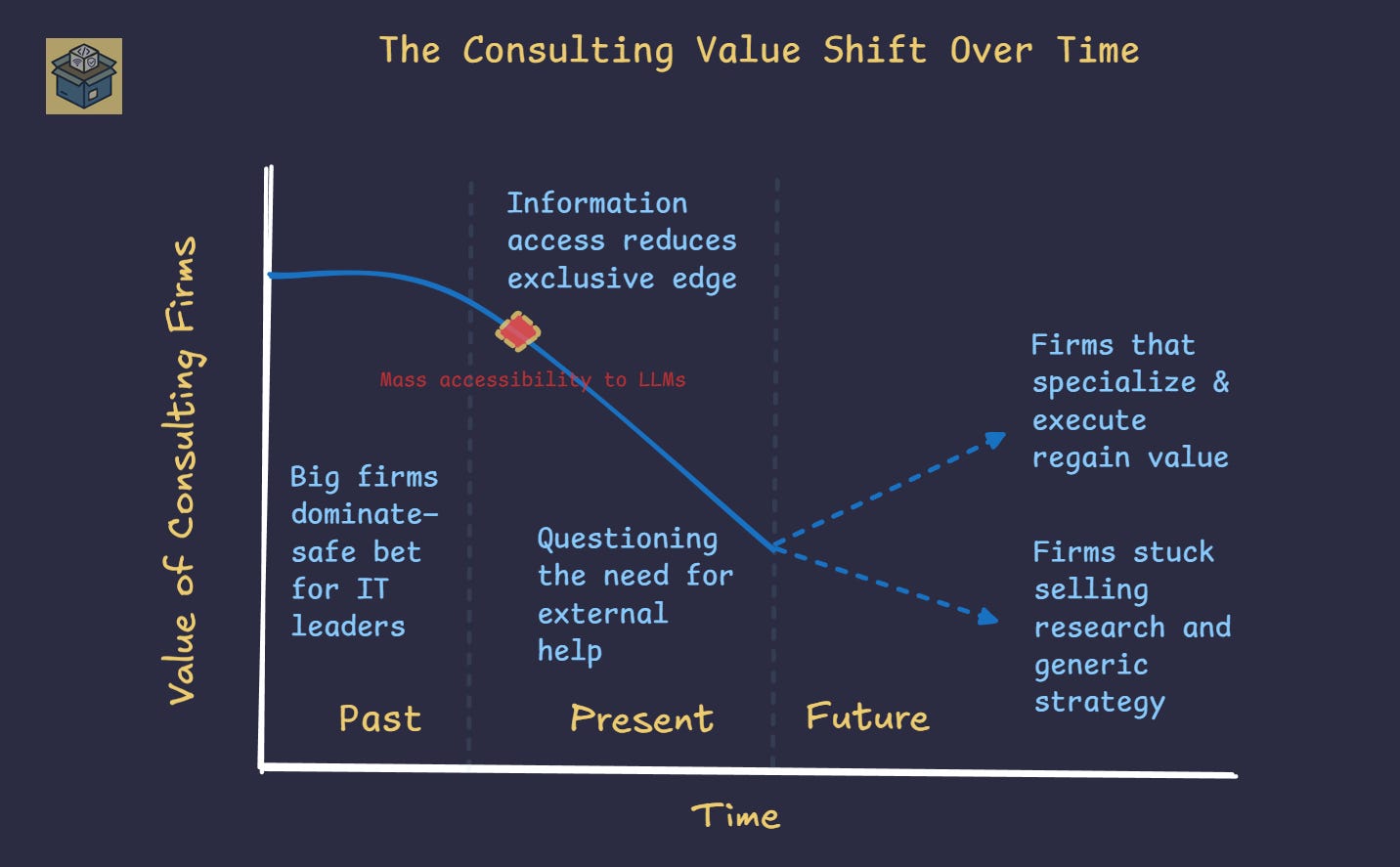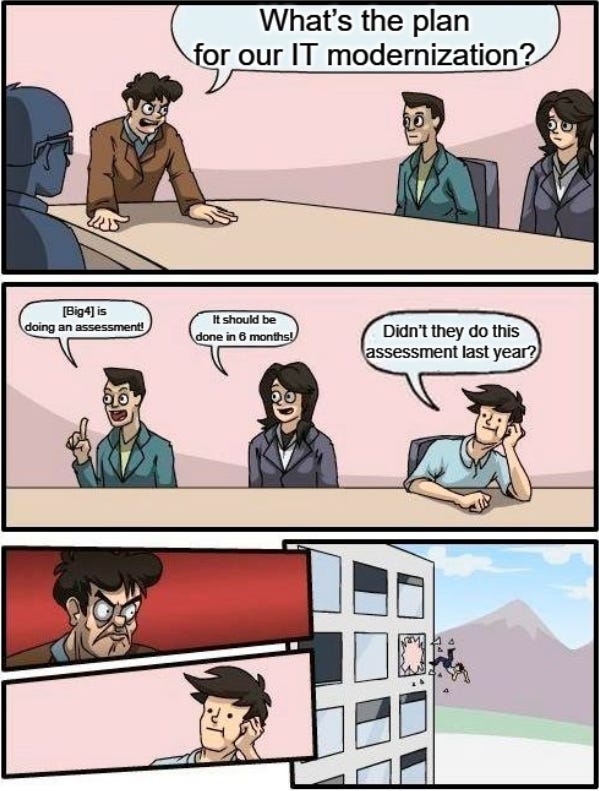Big Consulting's Moat Is Shrinking
Why your expensive insurance policy against bad decisions is no longer worth the premium now that we have Google 2.0 in our hands.
The Old Consulting Playbook Is Breaking and IT Leaders Need to Adjust
I’ve been on both sides of this.
As a consultant, I delivered advice and implementation *gasp*. As an IT leader, I made the call on whether to bring in external help or keep it in-house with intention.

What worked in the past for consulting organizations, particularly focused on the “management consulting” function is not going to keep working.
For decades, many big service firms won work through sheer manpower, attrition, and brand recognition. The old playbook by internal leaders? Bring in the safe option because, hey - “Nobody ever got fired for hiring [Big 4 Firm].” You’d get an army of consultants, a polished strategy deck, and a sense of security that your stakeholders wouldn’t question the decision.
That’s changing.
AI and LLMs aren’t replacing expertise, but they are shrinking the time it takes to get from problem to action. The moat that consulting firms built; access to knowledge, research capabilities, high-end analysis is shrinking.
It’s not just the consulting firms that need to adjust. Internal IT teams need to step up, too. Because now executives are starting to ask:
If we have instant access to information, why do we still need to bring in outside help?
The Crumbling Foundation of 'Safe Bet' Consulting
For decades, bringing in a well-known consulting firm was the default move for IT leaders. Need a strategy roadmap? Hire a firm. Struggling with an ERP rollout? Bring in external experts. Even when internal teams had a good grasp of the problem, an outside firm was often called in to make stakeholders listen.
It worked.
Not necessarily because consulting firms always had “game-changing” insights, but because they were a risk that was mitigated. If leadership pushed back on a decision, you could point to the high-priced consultants and say, “See? They said the same thing.” Nobody ever got fired for hiring [insert big firm here]. An expensive insurance policy, as it were.
But I’m seeing that playbook breaking down fast and it’s starting to erode service organization’s practice areas. Blame the economy, politics, or uncertainty all you want, but those are constants. There’s a bigger shift happening.
AI and LLMs are shrinking the time it takes to move from problem to action.
The once-exclusive knowledge that consulting firms built their business on is now accessible in seconds. It always was, but a browser search bar and thousands of results had to be meandered through, consolidated, and absorbed. That was just enough friction to outsource the work by clients. Now it’s served on a silver platter via Perplexity/ChatGPT/Claude/etc. - maybe not perfect but it has undoubtedly saved a shit ton of time and much less expensive than a $225/hr. rate associate.
Meanwhile, IT leaders are being asked:
If information is abundant, why are we still paying six/seven figures for research we could do ourselves?
It’s a wake-up call. Not only for consulting firms, but for IT teams as well. External expertise still has value, but the reasons for bringing it in are under scrutiny. The days of outsourcing endless analysis are fading. IT leaders don’t need more fluff, they need sharper, more actionable advice in order to get things done.
The new game isn’t about paying for quantity of thinking, but for the kind of expertise that actually puts them closer to rubber meeting the road.
Execution and capability expansion matter more than ever.
You’ve already started to notice the big firms pivot to teaching how to best use AI and LLM’s. The equivalent of teaching you how to use a shovel to dig for gold. That will work…for a while. The dynamics in the industry are moving and value is eroding as more internal functions within organizations are better equipping themselves.
But one looming question remains: If firms are able to leverage AI to work faster and more efficiently, will their rates and total project costs reflect that efficiency?
Will consulting firms pass those savings onto their clients, or will they pocket the gains while still charging legacy rates? The answer to this will determine which firms remain relevant and which become outdated relics of a bloated industry.
I see this as a great thing overall and will expose those hiding behind 0 substance.
The New Consulting Landscape: A Summary
Big firms are losing their “safe bet” status. Brand power alone isn’t enough anymore.
AI and LLMs are shrinking the research & strategy moat. Knowledge is no longer exclusive.
Executives are questioning the value of external help. If insights are instant, why pay six figures?
Consulting firms are pivoting to teaching AI use. But selling shovels instead of gold only works for so long.
IT leaders must be more selective.
We’ve got a pressure cooker of ingredients here, so if you’re an IT leader then you best take notice and adapt.
When Should IT Leaders Actually Bring in External Help?
Here’s how I think about it in simple terms when identifying whether I may need external expertise or not:
1️⃣ Do we already have access to the knowledge or data?
➡️ Yes → Don’t outsource thinking. Move on.
➡️ No → Keep going.
2️⃣ Is this knowledge truly proprietary or difficult to acquire?
➡️ Yes → Maybe worth bringing in.
➡️ No → Keep moving.
3️⃣ Is my team too stretched to execute effectively?
➡️ Yes → Execution support makes sense.
➡️ No → Why outsource?
4️⃣ Is this a one-time need or a recurring competency?
➡️ One-time → External help might be fine.
➡️ Ongoing skill? → Build it internally.
5️⃣ Is this critical to our competitive advantage?
➡️ Yes → Keep it in-house or work with highly specialized partners.
➡️ No → Maybe outsourcing makes sense.
Stop outsourcing so much thinking. Start outsourcing execution if you really need to.
It’s clearly not always as simple as that and there’s much more nuance to each situation, but you get the gist. There’s a lot of money to be made in analysis paralysis and busy work but you can avoid that.
Where External Help Still Makes Sense
I’m not saying external services are dead. But the why and when are shifting.
When You Should Bring in External Expertise:
You need compliance expertise that your team will never develop in-house.
You’re rolling out a massive ERP and don’t have the resources to lead the implementation.
A third party has proprietary benchmarking data that can reshape your strategy.
You need a very targeted SME based on their individual skillset and experience.
When You Should Keep It Internal:
You’re outsourcing research that your team could do in an afternoon.
You’re hiring an IT strategy consultant to tell you things you already know.
You’re relying on a consulting firm for core business capabilities that should belong to your company.
You might be saying “no shit, Sherlock”, but common sense isn’t as common as you’d think.
The Dual Wake-Up Call For Both Consulting Firms and IT Leaders
Look, I’m not anti-consulting. Not even close. I’ve spent half my career working in IT professional services. I’m saying the quiet parts out loud.
I do think the consulting and IT services industry is overdue for a reality check. It was already in an overleveraged position with bloated projects, extremely high rates, low value-roles pumping billable hours. Do you know how many endless hours are spent on slide decks?
If you want to humor yourself, visit reddit.com/r/consulting. I contribute to that subreddit more than I’m willing to admit.
Now the tables are turning. The question of value is being critiqued hard. The days of bringing in a firm just because it’s the “safe bet” are shrinking.
Executives are getting smarter about this. Internal teams are expected to do more. AI is reducing the need for bloated analyst work. And the firms that only provide recycled knowledge via classic Management Consulting engagements? They’re in trouble. It will not disappear, but the herd will be thinning.
The winners will be those that do at least one of the following:
✔️ Have proprietary data that can’t be sourced from public LLMs.
✔️ Offer efficient execution and capability expansion, not just advice.
✔️ Help internal teams scale instead of replacing them.
✔️ Dominate niche industry verticals.
✔️ Bring skills that are too expensive or rare to build in-house.
On the flip side, IT leaders need to wake up to the new reality, too. You can’t always lean on consultants because “that’s how we’ve always done it.”
You need to own your expertise and be selective about where external help actually moves the needle. You have more tools in your toolbox now.
IT leaders who keep defaulting to the “safe bet” will wake up to find that safe no longer means smart.
/end rant






